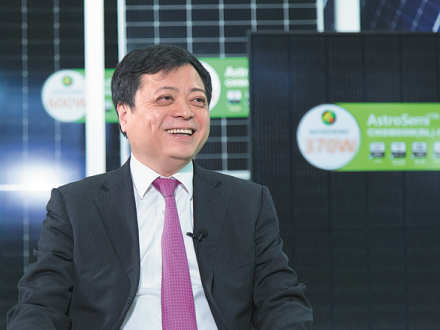Solar panel firm reflects new thinking on energy
Solar panel energy is clean and renewable and has long been considered the key to any country's efforts to transform its energy mix and safely boost supplies.
The Chint Group, an industrial electrical equipment and new-energy enterprise, is helping construct several hundred photovoltaic power stations in countries involved in the Belt and Road Initiative.
The Group is based in Wenzhou, Zhejiang province, which is known for its entrepreneurial spirit.
Nan Cunhui, chairman and founder of Chint, said: "While helping build photovoltaic infrastructure, we also brought our most advanced clean technologies and concepts to BRI economies, especially the underdeveloped ones, and that turned out to be an important accelerator of local economic and social development."
Born in 1963, Nan came from a poor family in Yueqing, a county-level city in Wenzhou. In order to make a living, at the age of 13 he dropped out of school and became a shoemaker like his father.
In the early 1980s, the country opened its doors to the world with economic and social reform.
Nan quickly embraced the changes and became a self-employed businessman using his own house as a workshop to produce electrical appliances.
In 1984, he borrowed money and with initial capital of 50,000 yuan (about $22,700 at the time) set up Yueqing Switch Factory. Seven years later, with foreign investment and advanced technology and equipment, he established the Sino-US joint venture Chint Electric, which later became the Chint Group.
In 2010, Chint was listed on the A-share market in Shanghai, and in the following years became a leader in the global low-voltage electric appliance industry.
In the 21st century, China began to promote transformation and upgrading of the industrial economy and development of new energy. Nan realized that optimizing energy efficiency was the way forward as the global power industry faced challenges from resource shortages, environmental pollution and climate change.
Chint entered the photovoltaic energy field in 2006, forming a full industry chain of power generation, energy storage, power transmission and distribution, and energy use.
The company has invested in and built photovoltaic power plants around the world with more than 6 GW of combined capacity. Average annual power generation of the plants is about 6.4 billion kWh, which the company estimates reduces carbon dioxide emissions by 6.47 million metric tons annually.
The company has more than 37,000 workers, and its operations have helped create a further 200,000 jobs in upstream and downstream industries. Its products and services are used in more than 140 countries and regions around the world.
In January, Minister of Ecology and Environment Huang Runqiu said China had begun formulating an action plan to peak carbon dioxide emissions before 2030 and will accelerate the transformation toward green and low-carbon development over the next 10 years.
Nan said, "Chint will continue to play its role as a Chinese enterprise in promoting carbon emissions peaking and carbon neutrality". He added the company would help in the evolution of a global commercial civilization with "safer, cheaper, more environmentally friendly and more convenient smart energy".
mazhenhuan@chinadaily.com.cn















